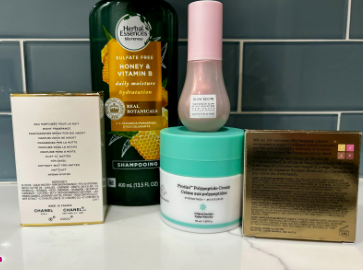Wait… Cosmetics aren’t regulated? The Food and Drug Administration (FDA) classifies cosmetics as “articles intended to be rubbed, poured, sprinkled, or sprayed on, introduced into, or otherwise applied to the human body…for cleansing, beautifying, promoting attractiveness, or altering the appearance” (FD&C Act, sec. 201(i)). Under this description, it includes most products that consumers use on a daily basis. The FDA relies on the cosmetic industries to police themselves, which withholds safety standards and puts consumers at risk. The ingredient “fragrance” on many products is also not required to be disclosed, causing some to have allergic reactions. The U.S. standards are much weaker compared to other countries and updates need to be made to these regulations.
If cosmetics are not closely regulated, it leaves consumers vulnerable to chemicals in their products. This is especially concerning with children who are starting to use makeup and skincare at an earlier age. Due to the rise of the younger generation on social media, they are influenced into buying cosmetic products. Claires–a popular children’s jewelry, makeup, and accessory retailer–was found to be selling makeup that contained asbestos. According to the New York Times, “The F.D.A…said Claire’s refused to recall the products. The agency issued a safety alert urging consumers not to use certain eye shadows, compact powders, and contour palettes.” Asbestos is often in talc based products because the minerals form together, causing contamination during mining. Although alternative ingredients to talc are available, there is no regulation that requires safer ingredients to be used.
Fragrance is a most commonly used element in making products appealing to consumers. From perfume to colognes, to nearly every product we use, they usually contain fragrance. Under the Fair Packaging and Labeling Act (FPLA), consumer products need to have a label of ingredients. However, the FDA states,“regulations for this list of ingredients must not be used to force a company to disclose “trade secrets” (FPLA, section 1454(c)(3)).” Therefore “fragrance” can be listed without the disclosure of what it may contain. While it is understandable that the formulation of a product cannot be disclosed, some potentially harmful ingredients should be labeled. How often do you check the label of your products and read the ingredients’ list? What about food items? Most often, people do not check the ingredients of their cosmetic products as frequently as they do for food. Madeline Pekrul, an Ipswich High School student said, “I usually don’t check the label on makeup, which I probably should, but shampoo I sometimes do.” Legislation requiring unbiased testing and disclosure of ingredients is needed to insure safety for consumers. Especially for those that have allergic reactions to ingredients that could be in fragrances.
Another problem regarding the regulation of the cosmetic industry is the FDA’s lack of power for recalls. The recall of cosmetics is a voluntary act by the manufacturers or distributors, and so the FDA can not force them to do so. For example “In cosmetics alone, the EU has banned or restricted more than 1,300 chemicals while the US has outlawed or curbed just 11” (The Guardian). With less restrictions on ingredients in the US, it leaves consumers vulnerable to health concerns linked to specific toxic chemicals. As stated by Dr. Gottlieb in the New York Times, “The legislation that determines the extent of the F.D.A.’s authority, the Federal Food, Drug and Cosmetic Act, has not been updated since it was enacted in 1938.” Since cosmetic companies are responsible for enforcing their own regulations, there is no incentive for the companies to self-regulate. Therefore, affecting consumers who could have reactions to their products.
The ineffectiveness between the FDA and cosmetic regulation is leading to people having sensitivities to the products they use. This is further enhanced by the rise of social media, which has brought younger kids into buying makeup, skin care, and other products, which could contain unsuitable ingredients for them. The good news is that consumers ultimately have the power to change regulations in the cosmetic industry by making their voices heard with local, state and federal representatives. While change in regulation takes place, be aware of the labels and pay attention to any ingredients that could cause irritation.





